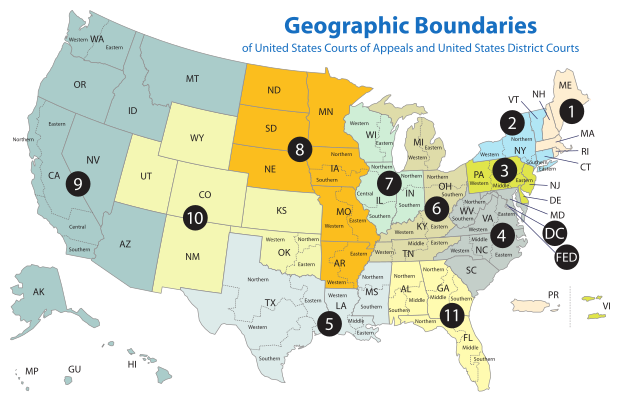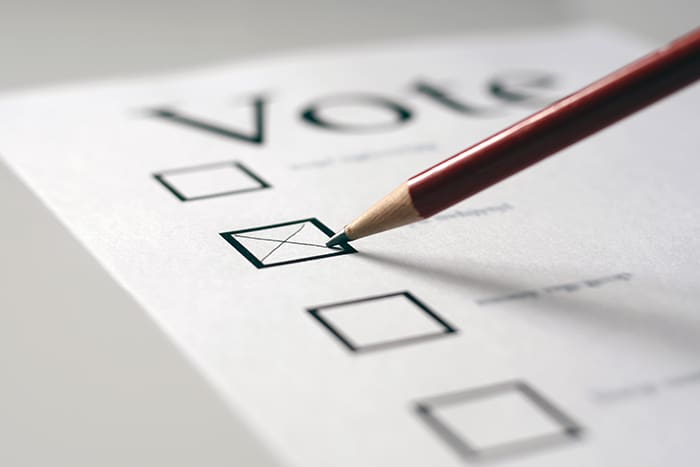
An intrepid gun owner from the Garden State asks:
Can you explain how rulings, such as Woollard v. Sheridan, impact other states? Lets say for arguments sake that the case is elevated to the supreme court and it is ruled that ‘may issue’ is unconstitutional and that ‘shall issue’ is the only lawful and appropriate route. What does that mean for me in NJ?
At RF’s request, I’ll be happy to take a stab at answering these questions, but I first have to stress that this is only my legal analysis, and not any kind of legal advice. If you’ve got your own real case going on or if you plan to challenge some state’s gun laws, you’ll need to talk to a qualified lawyer in your jurisdiction. Unfortunately, you’ll probably have to pay them too . . .
Background
Woollard v. Sheridan is a federal court case, decided about three months ago in the district of Maryland. Maryland prohibits carrying a handgun in any manner, open or concealed, without a handgun carry permit. Maryland is also a ‘may issue’ handgun permit state, where nobody gets the permit unless they bribe somebody or have friends in City Hall demonstrate “good and substantial reason to wear, carry, or transport a handgun, such as a finding that the permit is necessary as a reasonable precaution against apprehended danger.”
Plaintiff Woollard got his handgun carry permit after his son-in-law Kris Abbot, high on drugs, broke into Woollard’s remote house and assaulted him. The perp wrestled away Woolard’s shotgun, but Woollard’s son had his own gun and subdued Abbott. It took police two and a half hours to respond. It’s a good thing seconds count, because if minutes counted the po-po wouldn’t have been there until the following Friday. But I digress.
Woollard tried to renew his permit when it expired, but it was rejected because he failed to document any recent threats or violence from Abbott.
What Does Woollard Say?
I don’t have time to lay out a comprehensive constitutional analysis of Judge Benson Legg’s full opinion (and you probably don’t have the No-Doz to sit and read it) but the short of it is that Maryland’s ‘good and substantial cause’ requirement was found to infringe too far on the right to keep and bear arms, as set forth in SCOTUS’ recent Heller and McDonald decisions.
Although Woollard stuck down Maryland’s ‘good and substantial cause’ requirement for carrying a handgun outside the home, it specifically didn’t address whether such a requirement would be allowed for a concealed weapon permit. If ‘good and substantial cause’ can be required for issuance of a CCW permit, this decision seems to assume that open carry must be the unrestricted Plan B for security-conscious citizens. In many states, however, open carry is tightly restricted or prohibited outright.
How Will Woollard Affect Other States?
Woollard v. Sheridan was decided in United States District Court, and the decisions of U.S. federal trial courts are limited in their precedential impact. Trial court opinions only serve as ‘binding authority’ (i.e., other judges are expected to follow them, under the rule of stare decisis) within the same Federal court district, which in this case is only the state of Maryland. (Only 1.83 miles across, in one spot.)
Federal trial court decisions are still influential as ‘persuasive authority’ outside their own districts, however, since other courts often borrow their reasoning and analysis when facing similar questions of law. If New Jersey or Delaware had a similar ‘may issue’ licensing scheme for handgun carry permits, their respective federal courts would be reasonably likely to adopt the same reasoning that Judge Legg set forth. Or then again, maybe not. Like Fleetwood Mac, they can go their own way in the absence of binding authority.
In the end, the Woollard decision may end up having no value to anyone, including Mr. Woollard, because it’s headed for the 4th Circuit Court Of Appeals. If the 4th Cuircuit affirms the decision it becomes ‘binding precedent’ for all of the 4th Circuit, which stretches from Maryland and West Virginia down to South Carolina. At this point it would only be ‘binding precedent’ for those states in the 4th Circuit, unless the U.S. Supreme Court takes it up and affirms it as the law of the land. And if the 4th Circuit overturns it, it’s dead unless and until SCOTUS reinstates it.
New Jersey is in the 3rd Circuit, so our readers there won’t get any binding precedent out of Woollard unless it’s affirmed by Johnny Roberts And The Supremes, or unless a similar opinion is issued by New Jersey federal district court or the 3rd Circuit Court of Appeals. All of these outcomes are several years away, and far from guaranteed.
And even if Woollard becomes the law of the land under an expansive SCOTUS opinion some day (as our reader’s question optimistically presumes) this doesn’t magically erase all the ridiculous ‘may issue’ restrictions on the books in states beyond Maryland. Each one of them must be either repealed by that state legislature or declared unconstitutional by a court of competent jurisdiction in its own lawsuit. As we’re seeing in Chicago and the District of Columbia, this can take years and years so don’t hold your breath.




So you it seems that they can pass laws restricting rights faster than they can be repealed, effectively denying rights forever, since we can never catch up. Why even try to work within the system? Does anyone really wonder why there are groups like Sovereign Citizens?
“America is at that awkward stage. It’s too late to work within the system, but too early to shoot the bastards.” – Claire Wolfe
Which is why I say accelerate the inevitable by abstaining from the elections.
My comment was in reference to your last paragraph:
“And even if Woollard becomes the law of the land under an expansive SCOTUS opinion some day (as our reader’s question optimistically presumes) this doesn’t magically erase all the ridiculous ‘may issue’ restrictions on the books in states beyond Maryland. Each one of them must be either repealed by that state legislature or declared unconstitutional by a court of competent jurisdiction in its own lawsuit. As we’re seeing in Chicago and the District of Columbia, this can take years and years so don’t hold your breath.”
I hate not being able to edit.
Hang in there.
So precedent only matters if it’s within the same arbitrarily drawn district?
Not exactly. Precedent always matters, and it matters A LOT when it’s from within the same district or circuit. It matters a lot less when it’s from somewhere else, unless it’s from the Supremes.
Federal District Court and Court Of Appeals decisions based on the U.S. constitution are highly influential for framing the question and suggesting an analysis for other similar cases in other districts and circuits. They only have ‘controlling authority’ (which presumptively requires other courts to respect and follow that decision) within their own district or circuit.
Trial court decisions are not binding on anyone but the parties to the litigation (which in that case includes the State of Maryland). They are not binding on other trial courts in the same district, although they may be persuasive. (But being binding on Maryland, the decision is res judicata as to any other challenges to the same law on the same basis.)
What is most important about Woolard (outside of Maryland) is its rationale, and its simple conclusion that the only “good cause” needed to exercise a constitutional right is the right itself. You need not prove that there are exceptional circumstances that specifically justify your decision to bear arms outside the home. Further, Woolard, contrary to a decision of the Maryland Supreme Court, held that the right to bear arms exists outside the home.
You are correct, sir. I artlessly conflated res judicata and binding precedent.
We should all be pleased that a federal court has recognized a right to armed self-defense outside the home, but the discussion of ‘core’ 2nd Amendment rights and ‘non-core’ 2nd Amendment rights is very worrisome. More and more issues (such as where you can carry, or which calibers/magazines, or whether your CCW information is kept private) can get swept into the ‘non-core’ category over time.
I agree with the above corrective posts regarding the actual binding vs nonbinding effects of Judge Legg’s very bold and well reasoned opinion. But I am hoping that the most important effect of the decision will be the determination that the 2nd amendment is not limited to the home. All of the above reasoning applies – if the 4th circuit affirms, then it is the law of the land in WV, VA, MD, NC, and SC. If they reverse, then it is nothing, unless it goes to the Supremes for further review.
I encourage those who believe in the 2nd amendment to read Judge Legg’s decision. It will restore (at least some of) your faith in the integrity of the courts, or at least that all judges are not pro-government, and anti gun. Very powerful language in this decision.
I am also interested in they Wollard decision, as the same “good cause” applies in NY for a CCW (open carry is not illegal but may result in revocation of your permit if the approving authority so chooses).
I live in Erie County in Tonawanda (a suburb of Buffalo) and I have Cerebral Palsy (which in no way limits my safe operation, judgement etc w/ regards to personal defense and firearms). However I am financially disadvantaged ( on a monthly income) and cannot invest in then process for my CCW with no assurances. I have, in the past been a crime victim (unreported out of fear, latest was theft.. Reported, not pursued by police listed unsolvable). I don’t know what to do but often fear for my safety given the perceived dangers of daily life and my medical conditions, not to mention the fact that I often travel to Buffalo etc for medical care and am in a vulnerable portion of he populace because of my physical disadvantages.
I’ve facebooked a well known 2nd amendment attorney in Hamburg, with no reply. Any assistance, advice, guidance etc from anyone would be helpful. I am also on Facebook.
Thank you
JJ Whipple
Comments are closed.